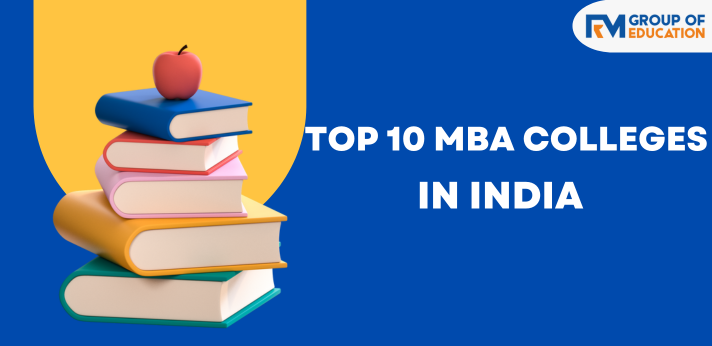Top 10 MBA Colleges in India: An esteemed postgraduate qualification, the Master of Business Administration (MBA), provides a comprehensive grasp of corporate management, leadership skills, strategic acumen, and proficiency in diverse business domains. Encompassing areas such as entrepreneurship, human resources, marketing, operations, and finance, pursuing an MBA enables collaboration with professionals, networking opportunities, and the practical application of theoretical knowledge. As adaptability and analytical skills continue to gain significance in the corporate sphere, graduates are aptly prepared for roles in consulting, leadership positions, and the initiation of entrepreneurial ventures.
MBA degrees are highly valued in the business sector since they provide opportunities for job progression and higher income. Grads are well-suited for leadership positions, entrepreneurial ventures, or consulting professions since their flexibility and analytical abilities are in high demand.
Subscribe to RM Group of Education Newsletter, Get Admission, Fees, Seats etc.
Table of Contents
| Top 10 MBA Colleges in India MBA Course Overview Eligibility Criteria Frequently Asked Questions (FAQs) |
Top 10 MBA Colleges in India
Here is the list of Top 10 MBA colleges in India. Learn more about each college by looking through detailed information such as costs, an overview, qualifying requirements, and average pay.
| S.No. | College Name | City | Establishment Year | College Fees |
| 1. | IIM Bangalore: Indian Institute of Management | Bangalore | 1973 | 23,20,000 |
| 2. | IIM Calcutta: Indian Institute of Management | Kolkata | 1961 | 22,60,000 |
| 3. | SPJIMR Mumbai: SP Jain Institute of Management and Research | Mumbai | 1981 | 24,00,000 |
| 4. | XLRI Jamshedpur: Xavier School of Management | Jamshedpur | 1949 | 28,00,000 |
| 5. | IIM Lucknow: Indian Institute of Management | Lucknow | 1984 | 19,25,000 |
| 6. | ISB Hyderabad: Indian School of Business | Hyderabad | 2001 | 22,50,000 |
| 7. | IIM Indore: Indian Institute of Management | Indore | 1996 | 21,07,000 |
| 8. | FMS New Delhi Faculty of Management Studies | New Delhi | 1954 | 1,92,000 |
| 9. | MDI Gurgaon: Management Development Institute | Gurgaon | 1973 | 20,86,670 |
| 10. | IIT Delhi: Department of Management Studies New Delhi | Delhi | 1993 | 8,80,000 |
Read also: Top MBA Colleges in Delhi
MBA Course Overview
Spanning two years, the Master of Business Administration (MBA) is a postgraduate program that imparts a comprehensive comprehension of the intricacies of business operations. The program strategically positions graduates for leadership roles by offering diverse employment opportunities across various industries. Covering essential domains such as finance, marketing, operations, human resources, strategy, and entrepreneurship, the MBA serves as a strategic gateway into the professional world, preparing individuals for success in their chosen career paths.
| Particulars | MBA Course Details |
|---|---|
| MBA Full Form | Master of Business Administration |
| Types of MBA | Full-Time MBA, Part-Time MBA, Executive MBA (EMBA), Online MBA, Global MBA, Specialized MBA, Dual MBA Programs, Mini-MBA, Joint MBA Programs, Modular MBA, Accelerated MBA, Dual Specialization MBA |
| Course Level | Post Graduation |
| MBA Course Fee | INR 2 Lakh – INR 25 Lakh |
| Eligibility Criteria | Bachelor’s degree |
| Top MBA Entrance Exams | CAT, GMAT, GRE, MAT, XAT, CMAT, IIFT etc. |
| MBA Admission Process | Entrance Exam + Group Discussion + Personal Interview |
| Exam Type | Semester |
| Average Salary | 5 Lpa to 25 Lpa |
MBA Courses Eligibility Criteria
The eligibility criteria for MBA (Master of Business Administration) programs can vary depending on the institution and country. However, here are some common eligibility criteria that are often considered:
| Particulars | MBA Course Details |
|---|---|
| Educational Qualifications | A bachelor’s degree or equivalent from a recognized university is typically required, with some programs having specific requirements for the undergraduate major or field of study. |
| Minimum Percentage/Grade | MBA programs typically require a minimum undergraduate degree grade of 50% or its equivalent. |
| Work Experience (if applicable) | Some MBA programs, particularly executive MBA programs, may necessitate a certain amount of work experience, typically a few years, in a managerial or professional role. |
| Entrance Exams | MBA programs often require applicants to take standardized entrance exams like GMAT or GRE, and may also consider other entrance exams like the CAT in India. |
| English Language Proficiency | International applicants or English-medium instruction programs may require proof of English language proficiency through tests like TOEFL or IELTS. |
| Letters of Recommendation | Some MBA programs may require letters of recommendation from professors, employers, or other professionals to assess the applicant’s abilities and potential for success. |
| Statement of Purpose (SOP) or Essays | Applicants may be required to submit a statement of purpose or essays detailing their career goals, reasons for pursuing an MBA, and other relevant information. |
| Interviews | Institutions often conduct interviews as part of the admission process to evaluate an applicant’s communication skills, motivation, and program fit. |
Frequently Asked Questions (FAQs)
what are the average fees for an MBA in India?
The average fees for MBA programs in India can vary significantly depending on the institute, the type of program, and whether it is a government or private institution.
What is the MBA course duration?
An MBA program might last between one and two years, depending on the structure and type of curriculum.
How can I prepare for the CAT exam?
To prepare for the CAT exam, familiarize yourself with the syllabus, exam pattern, and study materials. Use mock tests and practice questions to sharpen problem-solving skills.


